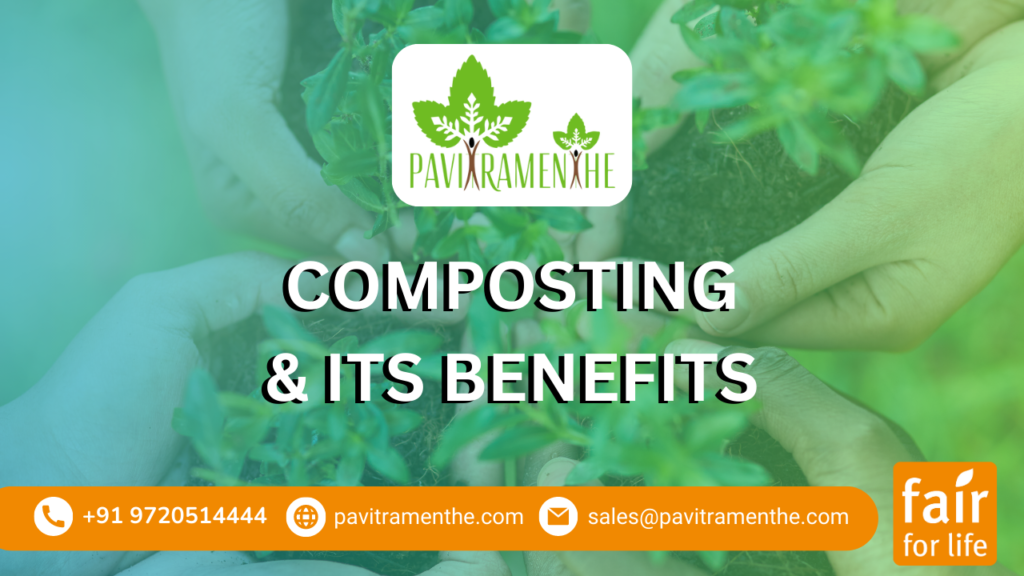what is composting and its Banifits:
Composting is a natural process in which organic materials, such as food scraps, yard waste, and other biodegradable materials, are broken down into a nutrient-rich soil amendment called compost. This process is facilitated by microorganisms, such as bacteria and fungi, that consume the organic matter and break it down into a stable, humus-like material that can be used to enrich soil and support plant growth.
Composting can be done at home using a variety of methods, such as a compost bin, pile, or tumbler, and can take anywhere from several weeks to several months depending on the conditions and materials used. The resulting compost can be used as a soil amendment in gardens, landscaping, and agriculture to improve soil health and fertility, retain moisture, and reduce the need for synthetic fertilizers and pesticides. Composting also reduces the amount of organic waste that ends up in landfills, where it contributes to greenhouse gas emissions and other environmental problems.
Composting can be done using a variety of organic materials,
including fruit and vegetable scraps, yard trimmings, leaves, grass clippings, coffee grounds, and eggshells. These materials are combined and layered in a composting bin or pile, along with a source of nitrogen, such as green plant material, and a source of carbon, such as brown plant material or shredded paper. The pile or bin is then regularly turned or aerated to provide oxygen for the microorganisms that are breaking down the organic matter.
Composting has numerous benefits for the environment, including reducing greenhouse gas emissions from landfills, conserving water by improving soil structure and moisture retention, and reducing the need for synthetic fertilizers and pesticides that can harm soil health and water quality. Composting is also an easy and cost-effective way to dispose of organic waste, and it can be done on a small scale at home or on a larger scale in commercial composting facilities.
In addition to traditional composting, there are also alternative methods, such as vermicomposting (using worms to break down organic matter) and bokashi composting (fermenting organic matter with bacteria). These methods can be useful for those with limited space or for composting materials that may not break down easily in traditional composting methods.
Overall, composting is a valuable practice that can help to reduce waste, improve soil health, and support sustainable agriculture and scaping practices.
Thermo composting and vermicomposting are two different methods of composting that can be used to create nutrient-rich soil amendments for gardening and agriculture.Thermo composting, also known as hot composting, involves creating a large pile of organic materials, such as food waste, yard trimmings, and manure, and then allowing the pile to heat up through microbial activity. The high temperatures generated during thermo composting help to break down the organic matter quickly and kill off any pathogens or weed seeds that may be present in the materials. This process usually takes a few weeks to several months, depending on the size of the pile and the materials used.
Vermicomposting, on the other hand, involves using earthworms to break down organic materials into compost. The worms consume the organic matter and then excrete nutrient-rich castings, which can be used as a soil amendment. Vermicomposting can be done indoors or outdoors, and is often used in small-scale or home composting operations.
Both thermo composting and vermicomposting are effective methods of composting that can help to reduce waste, improve soil health, and promote sustainable agriculture. The choice between the two methods may depend on factors such as the scale of the operation, the type of materials available, and the desired end product.
Conclusion:Composting is an easy and rewarding way to reduce food waste and create nutrient-rich soil for your plants. By following the basic steps outlined in this article, you can turn your food scraps into a valuable resource for your garden or houseplants. Remember to be patient and persistent – composting takes time, but the end result is well worth the efforts
Pavitramenthe makes two types of compost Both vermicompost and thermocompost offer several benefits to farmers.
Vermicompost is a type of compost made using earthworms. Here are some benefits of vermicompost to farmers:
Improves soil health: Vermicompost improves soil health by enhancing soil structure, increasing soil water-holding capacity, and boosting soil fertility.
Enhances plant growth: The nutrients in vermicompost are easily available to plants, promoting plant growth and development.
Reduces soil erosion: Vermicompost helps to prevent soil erosion by improving soil structure and increasing water-holding capacity.
Reduces the need for chemical fertilizers: Vermicompost is a natural and organic fertilizer that can replace chemical fertilizers, reducing the cost and negative environmental impact of chemical inputs.
Thermocompost, on the other hand, is a type of compost made using heat to break down organic matter. Here are some benefits of thermocompost to farmers:
Kills pathogens and weed seeds: The high temperatures used in thermocomposting kill harmful pathogens and weed seeds, making it safe to use in agricultural applications.
Improves soil structure: Thermocompost improves soil structure, allowing for better water and nutrient retention.
Read Also:
Conservation Tillage: Protecting Soil Health and Increasing Crop Yields
Cover Cropping & its Benefits
Crop Rotation and its Benefits
Floor Price Discussion with Farmers: Ensuring Fairness and Sustainability
The Impact of Fair for Life Stores: Driving Positive Change in the Supply Chain:
Health Benefits of Organic Herbs & Spices: A Natural Path to Wellness
Conservation of Biodiversity: Our Planet’s Ecological Wealth
Strong Mandate on Carbon Footprint
·

